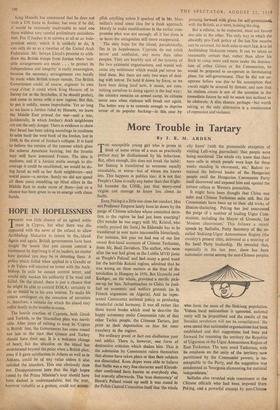HOPE IN HOPELESSNESS
THERE was little chance of an agreed settle- ment in Cyprus, but what there was dis- appeared with the news of the refusal to allow Archbishop Makarios to return to the, island. Again and again, British governments have been taught the lesson that you cannot control a movement by depriving it of its leaders, no matter how justified you may be in detesting them. A policy which failed when applied to a Gandhi or a de Valera will succeed no better with the Arch- bishop. In exile he cannot control terror, and would only weaken his authority if he tried and failed. On the island, there is just a chance that he might be able to control EOKA: certainly to do so would be in his own interest. To make his return contingent on the cessation of terrorism is, therefore, a mistake for which the island may suffer dearly in the months to come.
The hostile reaction of Cypriots, both Greek and Turkish, to the Macmillan plan was inevit- able. After years of striving to keep its 'Cyprus is British' line, the Government has come round too late to the view that Greece and Turkey should have their say. It is a welcome change of heart, but the situation on the island has deteriorated beyond the point when a British plan, even if it gave satisfaction in Athens as well as in Ankara, could be of any value unless it also satisfied the islanders. This one obviously does not. Disappointment here that the high hopes raised by the Prime Minister's tour should have been dashed is understandable; but the tour, however valuable as a gesture, could not accom- 'Ash anything unless It sparked off in Mr. Mac- millan's mind some idea for a fresh approach. Merely to make modifications in the earlier com- promise plan was not enough; all it has done is to leave the antagonists still more exasperated.
The only hope for the island, paradoxically, lies in its hopelessness. Cypriots do not relish terror and confusion, any more than other peoples. They are heartily sick of the tyranny of the two extremist organisations, and would wel- come any settlement which would put terror be- hind them. But there are only two ways of deal- ing with terror. To hold it down by force, as we have been doing (and now, it seems, are com- mitting ourselves to doing again) is the bad way: the country remains an armed camp, its citizens never sure when violence will break out again. The better way is to concede enough to deprive terror of its popular backing—in this case by pressing forward with plans for self-government, with the British, as it were, holding the ring.
But a referee, to be respected, must not favour one side or the other. The only way in which the absurdly pro-Turk policy of the last few months can be reversed, for both sides to start fair, is to let Archbishop Makarios return. It can be taken as reasonably certain that, rather than allow his flock to come more and more under the domina- tion of either Grivas or the Communists, he would be prepared to co-operate in formulating plans for self-government. That he did not co- operate before was due to his assumption that enosis might be secured by threats; and now that he realises enosis is out of the question in the immediate future he will be much less inclined to be obdurate. A slim chance, perhaps—but worth taking, as the only alternative is a continuance of repression and violence.






























 Previous page
Previous page